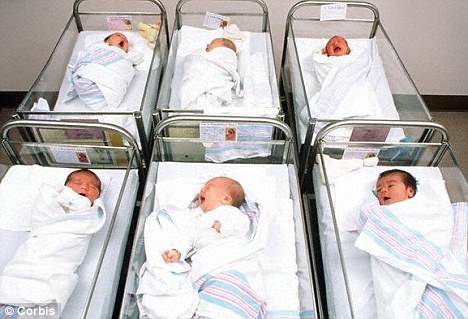The number of babies born to Muslims is expected to exceed the number born to Christians in about 20 years.
There have been more babies were born to Christian mothers than to members of any other religion in recent years, reflecting Christianity’s continued status as the world’s largest religious group.
However, this is unlikely to be the case for much longer.
According to a new Pew research report, 20 years from now, the number of babies born to Muslims is expected to modestly exceed births to Christians.
Muslims the world’s fastest-growing religious group and signs of this rapid growth already are visible. In the period between 2010 and 2015, births to Muslims made up an estimated 31 percent of all babies born around the world, far exceeding the Muslim share of people of all ages in 2015 and fewer than one in four.
The world’s Christian population also has continued to grow, but more modestly.
In recent years, a third of the world’s babies were born to Christians, which is slightly greater than the Christian share of the world’s population in 2015 of just over three in ten.
Also, in recent years, Christians have had a disproportionately large share of the world’s deaths, nearly one in four and in large part because of the relatively advanced age of Christian populations in some places.
This is especially true in Europe, where the number of deaths already is estimated to exceed the number of births among Christians. In Germany alone, for example, there were an estimated 1.4 million more Christian deaths than births between 2010 and 2015, a pattern that is expected to continue across much of Europe in the decades ahead.
Globally, the relatively young population and high fertility rates of Muslims lead to a projection that between 2030 and 2035, there will be slightly more babies born to Muslims; 225 million, than to Christians; 224 million even though the total Christian population will still be larger.
By the 2055 to 2060 period, the birth gap between the two groups is expected to approach 6 million with 232 million births among Muslims set against 226 million births among Christians.
In contrast with this baby boom among Muslims, people who do not identify with any religion are experiencing a much different trend.
While religiously unaffiliated people currently make up 16 percent of the global population, only an estimated 10% of the world’s newborns between 2010 and 2015 were born to religiously unaffiliated mothers.
This dearth of newborns among the unaffiliated helps explain why religious ‘nones’ (including people who identify as atheist or agnostic, as well as those who have no particular religion) are projected to decline as a share of the world’s population in the coming decades.
The regional distribution of religious groups is also expected to shift. For example, the share of Christians worldwide who live in sub-Saharan Africa is expected to increase dramatically between 2015 and 2060, from 26 per cent to 42 per cent, due to high fertility in the region. Meanwhile, religious switching and lower fertility will reduce the shares of the global Christian population living in Europe and North America.
The analysis is based on data from the recent report, The Future of World Religions: Population Growth Projections, 2010-2050, by Pew Research Center as part of the Pew-Templeton Global Religious Futures project, which studies religious change and its impact on societies around the world.

